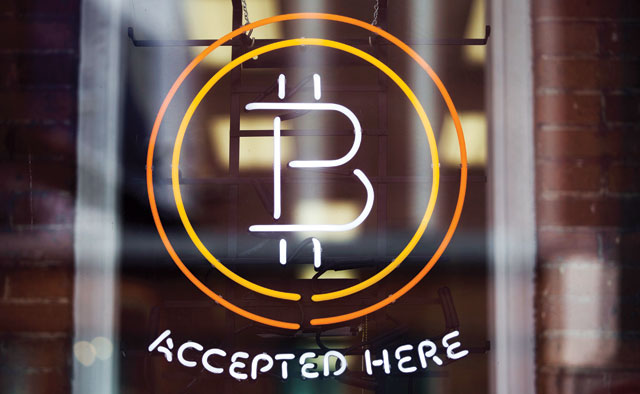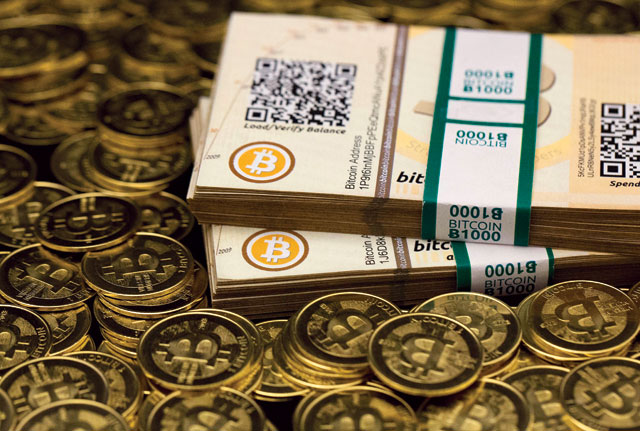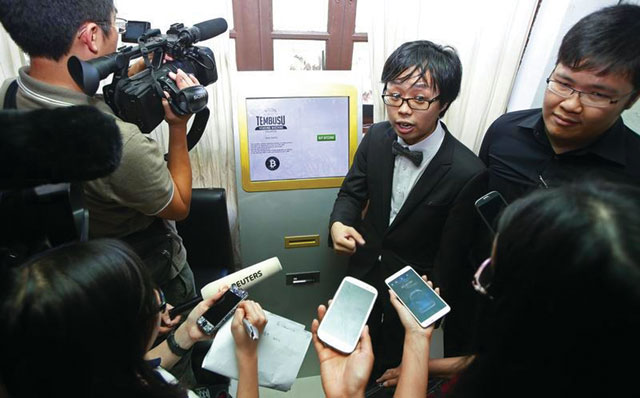For many, the digital currency known as bitcoin is a step into the future. For others, it is an unregulated liability. In a region brutally divided between the haves and have-nots, its benefits could spark a revolution
By Philip Heijmans
Southeast Asia sprints toward economic unification with the highly anticipated Asean Economic Community (AEC) next year, there is little in the way of monetary policy that binds its respective member countries together. However, entrepreneurs posit that in lieu of a single legal tender, there is a new system that could make cross-border exchanges cheaper and easier than ever – digital currency.
And it could be the contentious virtual tender known as bitcoin that provides the answer.

“If it can jump the regulatory hurdles, bitcoin technology could dramatically change the way that remittance takes place by reducing costs and transaction time. That could change lives around the world,” said Zennon Kapron, digital currency expert and managing director of Shanghai-based financial consultancy Kapronasia. “The real innovation with bitcoin is the nearly instant, global
and decentralised payments that the technology enables.”
The origins of bitcoins are murky, though they are said to have been developed in 2009 by Japanese developer Satoshi Nakamoto. Nevertheless, bitcoin exploded onto the global stage as a futuristic monetary tool most consider far ahead of its time – a self-propelling digital currency based on a decentralised peer-to-peer payment system that is exchangeable from portals anywhere around the world. Bypassing financial institutions, users get real-time market rates on any currency without being subject to large fees.
Though global usage is still relatively small and restricted to developed economies, the business of bitcoins is certainly not, achieving estimated valuations of between $7.5 billion and $10 billion.
What is more, the foundation for bitcoin usage is firmly rooted in Southeast Asia. Countries such as Singapore and Malaysia have already spawned a number of start-ups hoping to make the virtual currency more accessible to everyday consumers, while the first ever bitcoin ATM was installed in Singapore in March.
“Singapore and Hong Kong have traditionally been the financial service centres in Asia, so I would expect we will see them lead the way for bitcoin in the region. The challenge is to make bitcoin easier [to use] than what is already out there,” said Kapron. “Start-ups and entrepreneurs are working to make this happen by enabling bitcoin for ‘non-smart’ devices.”
One firm looking to do just that is Singapore-based payment processor CoinPip, which announced its intention in March to bring bitcoins to emerging markets in the region by allowing users to buy and sell the virtual currency via SMS. The technology, which integrates CoinPip’s own point-of-purchase technology with that of US-based systems developer 37coins, allows anybody with a mobile phone – of any calibre – to trade bitcoins simply by sending text messages through an established gateway in what is being called an ‘SMS wallet’.
“Southeast Asia is very diverse, but if you look at the region as a whole, more people have mobile phones than bank accounts,” said CoinPip co-founder Anson Zeall, adding that only one in three mobile phone users in the region have access to a 3G network, while most remain tethered to mobile services with no internet capacity. “Bitcoin is decentralised and does not need a telecoms operator, so I can go to Myanmar, set up an SMS gateway [that allows a computer to send or receive SMS to and from a telecom network] using the 37coins SMS gateway system, and then everyone can SMS the network owner through that gateway.”

According to Kapron, 2G SMS technology solutions are being developed and could be used for bitcoin in the much the same way they are currently used for mobile payments.
“Bitcoin ATMs are an example of how the technology could reach the non-online or less wealthy – a significant part of some Southeast Asian countries’ population,” Kapron added. “To use the ATM, recipients wouldn’t need a bank account or a phone. They could just go to the ATM, set up a bitcoin wallet and then give that wallet address to whoever is sending the money. The sender would remit money to the recipient’s wallet, and the recipient could then go to the ATM and withdraw in their local currency.”
Zeall admitted that his product was unlikely to have much of an immediate impact in rural areas with little access to funds or technology, but added that an SMS wallet may play well in areas outside of large cities, such as border towns where there is regular trading in multiple currencies. “Where there are banking and infrastructure problems… people will like it,” he said.
Though the prospect of a digital currency in today’s connected world seems promising, bitcoins are not without serious risks, with some financial experts arguing they are neither regulated as a sovereign currency, nor carry any sort of intrinsic value and are therefore incredibly volatile.
“The absence of a regulatory body makes it difficult to accept bitcoin as a currency. An electronic currency is a possibility as it will reduce transaction costs substantially, but there has to be a multinational or national authority with a proper regulatory framework to govern the use of it as a currency, including the payment and settlement,” said Cyn-Young Park, assistant chief economist at the Asian Development Bank. “While
I think there may be an electronic currency uniformly accepted by the global economy someday, it would take a different path of development from bitcoin.”
Without a regulatory framework in place to protect bitcoins as either a fully fledged currency or even a commodity – as some countries have deemed them – the digital currency has not played well with some governments, including China, who in December decided to bar its financial institutions from using them.
As a result of the ban, the value of bitcoins halved in January from $1,151 per bitcoin and has yet to recover, currently selling for less than $500 each.
Where China has opted to position itself against virtual currencies, countries in Southeast Asia are taking varying approaches. With nothing backing the currency, regulators in Malaysia and Indonesia have said they are unwilling to withstand the possibility of the destabilisation of bitcoin and have made them illegal.
“It is an interesting technology development, but there are too many risks and uncertainties for its widespread use and use as a substitute for currency,” said the ADB’s Cyn-Young Park.
Thailand, which carried a similar policy, reconsidered its position in February after the Bank of Thailand stated that there were no provisions banning them from being traded. They are now being traded on the open market.
The Monetary Authority of Singapore (MAS), meanwhile, said in a statement on March 3 that it would take a progressive stance on bitcoins by regulating their usage in an attempt to stem potential money laundering and terrorist activities, a factor that has been weighed by most regulators.

“Consumers and businesses should take note of the broader risks that dealing in virtual currencies entails and should exercise the necessary caution,” MAS deputy managing director Ong Chong Tee said in the statement.
Zeall said that, although illicit activities revolving around bitcoins are a concern, the scope of the problem is actually no worse than those of sovereign currencies, as all bitcoin transactions are recorded into a public ledger.
“I still think the best way to launder money is using cash because there is no evidence of transactions,” he said.
Nonetheless, banks in Southeast Asia remain cautious over the use of bitcoin.
“Acleda Bank could never consider taking exchanges in digital currencies like bitcoins since the risks involved are very high and it’s not allowed by the regulations of Cambodia at all,” said In Channy, CEO of the Cambodia-based commercial bank.
Grant Knuckey, CEO of ANZ Royal Bank, also in Cambodia, said that although digital currencies have had a difficult time gaining the regulatory foothold required in order to be
considered a legitimate legal tender, they nevertheless force monetary experts to reconsider the fundamental concept of money.
“It is easy to be dismissive of bitcoin, given it is a ‘non-sovereign’ currency with effectively an unknown issuer,” he said. “People may also mention the fact that bitcoin isn’t ‘backed’ by
anything intrinsic, but in fact all modern currencies are ‘fiat’ currencies – that is, they aren’t backed by any physical asset, have no intrinsic value, and their acceptance is, at its core, completely based on trust.”
Indeed, of the estimated $60 trillion said to be in the world’s money supply, just 8% is being circulated in hard currency, according to some estimates. With that in mind, digital currencies such as bitcoin are in some respects not much different than those used today.
“Globally, it’s far too early to say. I wouldn’t dismiss it out of hand – and in fact I’d go as far as to say that perhaps bitcoin is laying bare the illusion of fiat currencies,” Knuckey said.
“Virtual currencies are here to stay,” agreed Kapron, “but it is unclear if bitcoin will be the future.”
Keep reading:
“Betting on the house” – Strong economic growth and a supply of cheap money is likely to drive Southeast Asia’s property markets this year, even as risks loom

